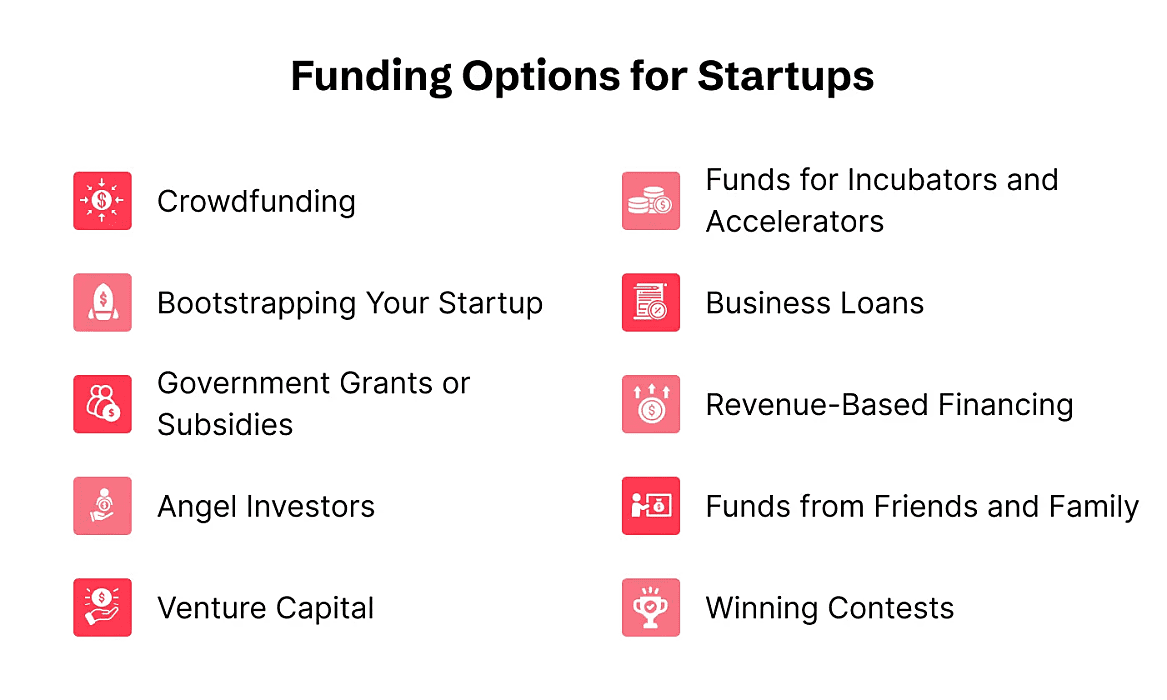
You have confidence in your startup’s potential, and it is time to find investors with relevant funding options for startups of your niche. But convincing someone else to invest large sums in it is a different ball game. Despite these challenges, thousands of startups aim to raise funding every year.
After all, the potential rewards outweigh the risks and trouble.
Think of being successful at the end of it. The capital can open doors for your startup to thrive and become what you hoped it would be.
Now, the questions remain: How do you get startup capital, and what are some available funding options for startups?
The blog covers the best funding options for startups and their pros and cons. We’ll also discuss which financing channel is suitable for different businesses.
Best Funding Options for Startups for Your Business’s Success

From renting an office to hiring new staff, funding is the lifeblood of a business. The good news is that there are the best small business funding options available today. In 2022, investors contributed $415.1 billion to startups globally.
Yet, businesses fail to raise capital because they lack understanding and knowledge of different startup funding models and their financing requirements.
These sources can also affect the ownership equation of your business.
For example, small-business loans let you retain full ownership of your startup. On the other hand, getting business funding for startups from investors may lead you to share equity and ownership rights.
So, it’s best to consider each source individually and find the most suitable startup business financing options.
[Bonus Read: How to Get Investors for Mobile App - An Ultimate Guide]
1. Crowdfunding
Crowdfunding is about raising money for your business through online campaigns and social networks. This allows anyone who comes across your campaign to fund your startup. It can involve large groups of friends and family, strangers, and even investors who find your startup ideas intriguing.
Over the years, it has become one of the primary new business funding options. About 83% of companies using crowdfunding campaigns often reach their funding goals. Some popular crowdfunding platforms are GoFundMe, Wefunder, Kickstarter, etc.
These online business funding options are great for raising money without sacrificing any share of the equity. To help you better understand, here are some pros and cons of crowdfunding as a viable start up business funding option.
Pros
- Wider audience to reach and influence.
- Involves no ownership dilution.
- Crowdfunding platforms help test the market and learn about the audience's reaction to the idea and sentiments.
- Online platforms allow you to easily set up a campaign.
Cons
- Fierce competition demands unique storytelling and idea pitch.
- No guarantee of funding at all.
- Limited funding, even if the campaign is successful.
- Added pressure to deliver the promised product.
- Regulatory challenges as it is a relatively new funding option. As a result, there are often unclear and shifting regulations around crowdfunding campaigns for startups.
2. Bootstrapping Your Startup
As popular as a self-financing option, bootstrapping is one of the best funding strategies for startups. Especially if you have not done this before, convincing someone to take chances on your business is a hard game to play.
Even with the best startup ideas, people fail to raise enough capital to fund them. Although it is not technically a true funding option for a startup online business to get money, it is the easiest route if you can finance your initial years of business.
Even the most thriving businesses today result from bootstrapped money. One successful bootstrapping startup funding example is GitHub, which the founders bootstrapped for the first two years of its existence.
Further, it can be an extremely gratifying way to fund your business. It is like building something from scratch. First-time entrepreneurs can use this option to show their worth and seek outside funding after tasting some success.
Let’s examine the pros and cons of bootstrapping to determine whether it is one of the best alternative business funding options.
Pros
- Retains full ownership.
- Better control over crucial decisions that allows you to focus more on building a business foundation.
- Limited debt leads to less worry about paying off the borrowed money.
- Little to no administrative issues.
Cons
- Financial risk as you may lose your savings in the process.
- If the business takes a hit due to unexpected expenses or fewer sales, it can create stress and have a mental impact.
- Harder to develop your customer base from scratch and find collaborators.
- Slower growth due to a relatively lower budget.
3. Government Grants or Subsidies
Governments run various programs to fund businesses, such as grants, loans, and tax credits. However, these programs also have strict eligibility criteria. These can include industry-specific limits and the impact they will create on the local economy.
Grants are often non-repayable funds given to businesses for specific purposes. Startups can use these grants for research and development, environmental initiatives, etc.
You can also try government agency loans with lower interest rates and more flexible repayment terms. Small Business Administration (SBA) and microlending loans are some examples of government funding.
Pros
- No repayment is needed.
- Winning grants can increase your visibility and credibility in the market.
Cons
- Only cover a percentage of the cost.
- Grants often take time to process.
- Fierce competition decreases your chances of getting considered.
- Startups need to prove the potential impact of their project.
- Often, it has conditions; for example, you must agree to create jobs at a rate set by the grant provider.
4. Angel Investment
Angel investors provide financial support for your startup at an early stage. Often, experienced and successful entrepreneurs become angel investors to help new startups. But, they also seek a high stake in your business in exchange for the funds.
Angel investors are popular for investing and taking risks in innovative and new ideas. Here are some pros and cons of considering angel investment as one of the startup funding options.
Pros
- Investors are willing to take risks.
- Usually no debt to repay.
- Angel investors also bring years of expertise.
Cons
- You may need to give up high stakes.
- Less control in business decision-making.
- Added pressure to deliver high returns in less time.
5. Venture Capital
Venture capitalists, or VCs, are professional investors. Like angel investors, VC firms and independent VCs give you cash in return for a share in your company. However, VC firms tend to invest larger sums compared to angel investors.
Having a VC backing is one of the most popular and best business funding options. Not only is the capital you raise bigger, but it can also boost your reputation as an early-stage startup.
But, it also means you must offer a high return on their investment. Further, you must put some work into your pitch to attract investors. Even after you get the investment, be ready to take higher risks and deliver the return promised.
Here are some pros and cons of VC funding.
Pros
- Access to industry knowledge and experience of VCs.
- Valuable connections and networking opportunities.
- No burden of debt.
Cons
- Need to give up equity and control over your business.
- High expectations for rapid growth.
- VCs have a high influence, causing a risk of overshadowing.
- Attracting VCs is not a simple task. It takes time, energy, and hard work to impress these firms.
6. Funds for Incubators and Accelerators
Business incubators and startup accelerators are programs to help early-stage startups grow. While both help startups with funding, their terms and duration differ.
Incubators often offer long-term support to startups. They also offer IT assistance, office space, and other resources at subscription-based fees. You also get mentorship from experienced professionals who aim to nurture your startup.
On the other hand, accelerators offer short-term support to early-stage startups. They also offer resources, mentorship, and funding in return for an equity share.
Pros
- Bring in the expertise and experience.
- Boost your startup’s reputation.
- Helps build connections and expand your network.
Cons
- Programs demand time commitment from founders.
- Lack of control over decisions.
- They have rigid schedules and expectations from startups.
7. Business Loans
Banks and other financial institutions provide money to help your business. It is one of the most used and traditional funding options for small businesses. But, you must repay the money you get to the lender with interest.
Here are the pros and cons of getting these loans as your small business funding options.
Pros
- No effect on the ownership or control over your business.
- Helps you build a business credit score.
Cons
- Less capital.
- Non-repayment of a loan can harm your credit score.
- Interest on the loan amount costs more.
- Strict eligibility requirements for approval.
8. Revenue-Based Financing
Revenue-based business startup financing options are an alternative way to raise capital by tying it to revenue streams. Startups and growth companies often use this option and for good reasons.
It is the best option if you want a non-dilutive way based on company revenue streams. Revenue-based financing helps startups with consistent revenues that can be used as a growth finance instrument. It means you do not need to sell your shares in exchange for equity capital.
Further, the repayment terms depend on the company’s performance, which can be flexible. If your business makes more profit, you can repay the agreed amount quickly.
Let’s consider the pros of revenue-based funding in more detail.
Pros
- Flexible repayment based on the revenue you earn.
- Non-dilutive, so you do not need to give up ownership in return for the funding.
- Allows you to grow at your own pace.
- Easy to apply.
- Low cost of capital.
Cons
- Must show consistent revenue and growth to get the funding.
- Requires regular monthly repayment.
- Smaller capital amount than VC.
9. Funds from Friends and Family
Did you know that 22% of new startup owners rely on friends and family for capital during the first three months? In fact, this is the first avenue to turn to for investing in the business. It allows you to control your business fully and involves less formal partnerships.
But, to make it a success, one must handle such relationships with professionalism and transparency.
Preparing a plan outlining your vision, goals, and financial projections is best. Also, consider signing a contract to set clear terms of the business partnership. Do not hesitate to discuss such investments' potential risks and rewards.
Pros
- The best and easiest way to raise initial capital.
- Gives full control over your business.
- Better financing terms, leaving you with more returns.
Cons
- The people involved may not be business-savvy.
- This may create strain in the relationship, often leading to weird personal dynamics.
- Financial loss can badly affect the bonds.
- Added responsibility of giving positive returns on their investment.
10. Winning Contests
Winning contests and competitions are common in the startup culture. Big companies and business associations often host these pitch contents to help startups gain funding. The aim is to encourage startups to grow their business.
Entrepreneurs compete in the event and pitch their startup ideas to the judges. A stand-out pitch wins participating companies' investment capital and other valuable resources. Popular competitions include the Startup World Cup, Microsoft BizSparks, and SXSW Pitch.
Pros
- Most competitions offer investment capital without any equity in return.
- Access to new contacts and experienced entrepreneurs.
- Gives you visibility and media coverage.
Cons
- People present at the contest can steal your startup idea.
- You may not get enough capital.
- Losing a contest can be demoralizing.
Understanding the Different Types of Funding Rounds for Startups

One of the most important considerations when choosing the right funding option is your startup’s growth stage. So, let’s learn about the different funding rounds for startups.
Pre-Seed Funding
Pre-seed funding is for the startup's initial stage, helping it kick off operations. In most cases, bootstrapping and funds from friends and family help the startup at this stage because most investors hesitate to invest in exchange for equity at this stage.
Seed Funding
Seed funding helps the business grow. The funds from investors at this stage and revenue empower the business and help it take the startup to the next level.
Investors often put their money into the startup for product development, market research, and expansion. It also allows them to narrow down their final products and target demographic.
The seed funding options for businesses include bootstrapping, friends and family, accelerators and incubators, venture capital, angel investors, etc. Investors are ready to put their money into your business if you can show early traction or offer a product demo.
Early-Stage Funding
The early stage covers the funding for series A or series B. During this stage, the startup looks to scale its operations with some initial success. Their product has a growing customer base.
Venture capital and debt financing are common financing options for startups. Angel investors, bootstrapping, and crowdfunding may not offer much help as the startup is already off the ground and needs better funding sources.
Growth-Stage Funding
It loosely covers the Series B to Series C funding rounds. This stage of funding is all about rapid growth and business expansion.
During this stage, the startup is already rapidly growing and is successful in the market. As a result, venture capital makes less sense to founders as they may not wish to give up further equity.
This is why revenue-based financing works best here. The company has a track record of success and can generate more revenue.
Late-Stage Funding
The startup gets ready for an exit at this stage. They can either go for IPO (Initial Public Offering) or acquisition for this. VC funding, angel investor funding, and other dilutive options get less preference due to the loss of ownership in these options.
Again, revenue-based financing and other forms of non-dilutive funding work best here. These can act as the perfect way to fulfill temporary capital needs. Further, it does not lead to sacrificing ownership or promising new exponential growth.
Startups at this stage can also opt for debt financing for similar reasons.
Final Thoughts
Lack of funding is one of the primary causes behind startup failure. According to CBInsights, 38% of startups fail if they do not raise new capital. This highlights why raising funds is necessary for the startup’s survival.
It’s even more important to find the right source of funding for startups. While there is no perfect way of raising capital, consider the top funding options.
Take your time and discuss all the available options. Use data and in-depth analysis to understand the startup financing requirements.
Research all the options and learn about the different funding stages. If self-funding is not viable, map out a plan to pitch your idea to investors. Select the funding options for startups that align with your vision and goals.
[Bonus Read: Tips by Entrepreneurs and Corporate Leaders to Run a Startup without Investments]
Frequently Asked Questions
-
How to get funding to start a business?
Besides selecting the best financing option, it takes work to convince the investors and lenders. Here are some funding strategies for startups.
- Prepare a business plan with well-researched data to back your profit projections.
- Ensure you maintain a good credit score to show your credibility.
- Create a detailed investment structure to give investors a clear idea. Ensure that the investors' power and responsibilities are included during key decision-making.
- Be sure to build a strong team with an ideal founder-market fit.
Once you cover the bases, pitch your idea to investors by contacting them through different channels.
-
What are startup financing options?
-
What type of funding is best for startups?











